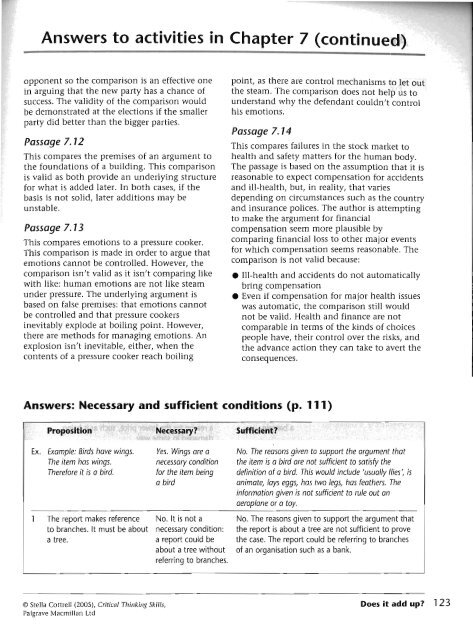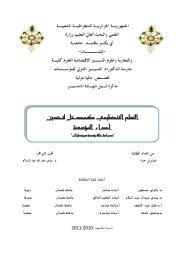Critical Thinking Skills - Developing Effective Analysis and Argument(2)
Critical Thinking Skills - Developing Effective Analysis and Argument(2)
Critical Thinking Skills - Developing Effective Analysis and Argument(2)
You also want an ePaper? Increase the reach of your titles
YUMPU automatically turns print PDFs into web optimized ePapers that Google loves.
Answers to activities in Chapter 7 (continued)<br />
opponent so the comparison is an effective one<br />
in arguing that the new party has a chance of<br />
success. The validity of the comparison would<br />
be demonstrated at the elections if the smaller<br />
party did better than the bigger parties.<br />
Passage 7.72<br />
This compares the premises of an argument to<br />
the foundations of a building. This comparison<br />
is valid as both provide an underlying structure<br />
for what is added later. In both cases, if the<br />
basis is not solid, later additions may be<br />
unstable.<br />
Passage 7.13<br />
This compares emotions to a pressure cooker.<br />
This comparison is made in order to argue that<br />
emotions cannot be controlled. However, the<br />
comparison isn't valid as it isn't comparing like<br />
with like: human emotions are not like steam<br />
under pressure, The underlying argument is<br />
based on false premises: that emotions cannot<br />
be controlled <strong>and</strong> that pressure cookers<br />
inevitably explode at boiling point. However,<br />
there are methods for managing emotions. An<br />
explosion isn't inevitable, either, when the<br />
contents of a pressure cooker reach boiling<br />
point, as there are control mechanisms to let out<br />
the steam. The comparison does not help us to<br />
underst<strong>and</strong> why the defendant couldn't control<br />
his emotions.<br />
Passage 7.74<br />
This compares failures in the stock market to<br />
health <strong>and</strong> safety matters for the human body.<br />
The passage is based on the assumption that it is<br />
reasonable to expect compensation for accidents<br />
<strong>and</strong> ill-health, but, in reality, that varies<br />
depending on circumstances such as the country<br />
<strong>and</strong> insurance polices. The author is attempting<br />
to make the argument for financial<br />
compensation seem more plausible by<br />
comparing financial loss to other major events<br />
for which compensation seems reasonable. The<br />
comparison is not valid because:<br />
Ill-health <strong>and</strong> accidents do not automatically<br />
bring compensation<br />
Even if compensation for major health issues<br />
was automatic, the comparison still would<br />
not be valid. Health <strong>and</strong> finance are not<br />
comparable in terms of the kinds of choices<br />
people have, their control over the risks, <strong>and</strong><br />
the advance action they can take to avert the<br />
consequences.<br />
Answers: Necessary <strong>and</strong> sufficient conditions (p. 11 1)<br />
Proposition Necessary Sufficient<br />
Ex. Example: Birds have wings.<br />
The item has wings.<br />
Therefore it is a bird.<br />
Yes. Wings are a<br />
necessary condition<br />
for the item being<br />
a bird<br />
1 The report makes reference No. It is not a<br />
to branches. It must be about necessary condition:<br />
a tree.<br />
a report could be<br />
about a tree without<br />
referring to branches.<br />
No. The reasons given to support the argument that<br />
the item is a bird are not sufficient to satisfy the<br />
definition of a bird. This would include 'usually flies', is<br />
animate, lays eggs, has two legs, has feathers. The<br />
information given is not sufficient to rule out an<br />
aeroplane or a toy.<br />
No. The reasons given to support the argument that<br />
the report is about a tree are not sufficient to prove<br />
the case. The report could be referring to branches<br />
of an organisation such as a bank.<br />
O Stella Cottrell (2005), <strong>Critical</strong> T/ziilkiilg <strong>Skills</strong>, Does it add up 123<br />
Palgrave Macmillan Ltd



